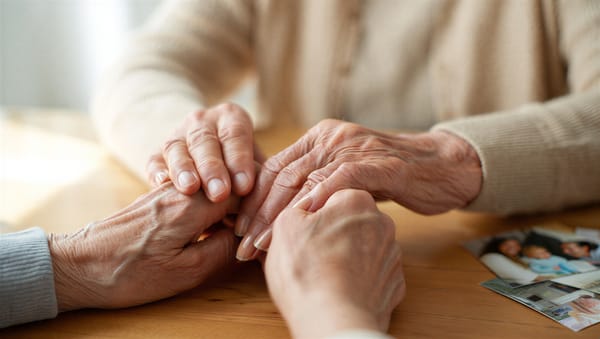Anniversary Grief Support: Navigating Difficult Dates
Anniversary grief support for navigating difficult dates. Find expert guidance and coping strategies for managing grief resurgence on important dates.

Key Takeaways
- Anniversary grief is a natural cyclical response to loss that can intensify around meaningful dates, even years after a death
- Professional support options include grief counseling, bereavement therapists, and specialized anniversary grief counseling programs
- Planning ahead 4-6 weeks before difficult dates helps reduce anticipatory anxiety and creates meaningful ritual opportunities
- Tangible memorial practices provide consistent comfort across anniversary cycles when emotions feel overwhelming
- There is no "right" timeline for anniversary grief, and support needs may vary with each passing year
Reflections on love, loss, and the ways we carry them.
As the anniversary of a loved one’s passing approaches, many find themselves unsettled without knowing why, until they glance at the calendar. The body remembers, even when the mind tries to move forward. This is what we call anniversary grief. A natural, cyclical response to loss that can surface years, even decades, later. It’s not a setback. It’s love finding its way through time.
I once worked with a woman named Liza, who lost her husband suddenly six years ago. Every December, she’d feel a tightening in her chest and an inexplicable sadness she couldn’t shake. When we traced the feeling back, she realized it always began around the week of their wedding anniversary. Together, we created small rituals such as lighting a candle, writing him a letter, playing their favorite song. These simple acts gave her grief a voice and her love, a place to go.
Parting Stone often reminds us that remembrance can be both tactile and healing. Holding something solid, like their beautifully crafted memorial stones can help ground us when grief feels overwhelming. There is something profoundly comforting about having a physical connection to the person we’ve lost, something that says: You are still part of my life, still with me in another form. For many, this transforms remembrance from something abstract into something quietly sacred — a gesture of love you can touch.
Grief, after all, doesn’t vanish; it transforms. On these difficult dates, we can care for ourselves intentionally. Plan the day with gentleness, surround ourselves with people who understand, or spend time in quiet reflection. You might choose to honor your loved one through acts of kindness, visit a meaningful place, or simply rest.
The goal isn’t to erase the ache, but to integrate it. To make space for both memory and life. As I often tell the bereaved, there’s no “getting over.” There’s only growing around the loss, until remembrance becomes less about pain and more about enduring love.
Cathy Sanchez Babao
Parting Stone Grief Coach
The calendar date approaches. Perhaps it's the anniversary of their death, their birthday, or a holiday you once celebrated together. You might notice the weight settling in weeks before, a heaviness you can't quite name until you check the calendar and realize what's coming.
Anniversary grief support becomes essential during these difficult dates, not because something is wrong with your grief, but because the cyclical nature of loss deserves intentional care. Research from the Center for Complicated Grief at Columbia University shows that anniversary reactions occur in approximately 30-50% of bereaved individuals, with intensity varying based on attachment, circumstances of the death, and available support systems (Shear et al., 2011).
You might wonder if you should be "over this by now." The answer is simple: grief doesn't follow schedules or social expectations. What you're experiencing is a natural human response to loss, amplified by the temporal markers that our minds and bodies recognize, sometimes before we consciously remember.
Understanding Anniversary Grief: What Happens on Difficult Dates
Anniversary grief, sometimes called anniversary reactions or cyclical grief patterns, describes the intensification of grief symptoms around dates associated with loss. These dates might include death anniversaries, birthdays, holidays, wedding anniversaries, or other personally significant occasions.
The phenomenon isn't limited to the first year. Many people report that grief resurgence on anniversaries can continue for years, sometimes intensifying unexpectedly on certain milestone years like the fifth or tenth anniversary.
The Psychology Behind Anniversary Reactions
Your mind and body track time in ways that operate below conscious awareness. The limbic system, which processes emotions and memory, responds to temporal cues with particular sensitivity. Dr. Katherine Shear, founder of the Center for Complicated Grief, explains that anniversary reactions represent a form of conditioned emotional response where specific dates trigger memories, emotions, and even physical sensations associated with the original loss (Shear, 2015).
This isn't weakness or regression. It's your attachment system recognizing an absence on a day when presence mattered. The psychological literature on continuing bonds suggests that maintaining connection with deceased loved ones is healthy and normal, and anniversary dates often bring that connection into sharper focus alongside the pain of physical absence (Klass et al., 1996).
@chloebluffcakes Thank you @partingstone 🤍 youve given me an unimaginable gift. One day I will share these with my little sister and carry her wherever we go in life together. #grief #partingstone #loss
♬ Repeat Until Death - Novo Amor
Types of Difficult Dates
Anniversary grief support addresses multiple categories of challenging dates:
- Death anniversaries often carry the most intense emotional weight, particularly in early years. The mind may replay circumstances of the death or final days together.
- Birthdays of the deceased present a unique form of grief, marking not just absence but all the future celebrations that will never occur.
- Holidays and seasonal celebrations can feel hollow without your person, particularly if you shared special traditions or rituals.
- Personal milestones like graduations, weddings, or births of grandchildren emphasize their absence in moments they should have witnessed.
- Unexpected triggers including weather anniversaries, seasonal changes, or even smells and sounds associated with the time of death can create unscheduled difficult dates.
Lynn from Houston, Texas 🖤, who lost her husband after 53 years together, shares: "I have been able to quietly and privately place stones in places that were meaningful to us through our 53 years together, share them with family and the closest of friends, and keep a few close to favorite photographs. They are a beautiful and comforting presence." Her experience illustrates how memorial practices can provide consistent support across anniversary cycles.
Cremated remains can feel messy and meaningless. Instead of receiving a box of ashes following cremation, you can now receive a collection of stones. Solidified remains let you feel connection with the remains of your departed. Turn your ashes into stones at https://partingstone.com
Why Anniversaries Intensify Grief: The Science of Cyclical Patterns
Understanding why anniversaries affect you helps normalize the experience and reduce secondary distress about having these reactions. Multiple psychological and neurobiological factors contribute to anniversary grief intensity.
Anticipatory Grief Before the Date
Anticipatory grief doesn't only occur before death. It also emerges in the weeks leading up to difficult anniversary dates. You might notice increased anxiety, sleep disturbance, irritability, or sadness beginning 4-6 weeks before the anniversary.
This anticipatory pattern serves an adaptive function, preparing your emotional system for a date your mind recognizes as significant. However, it can also create a prolonged period of distress that benefits from anniversary grief help.
Memory Consolidation and Temporal Markers
Neuroscience research on memory consolidation shows that emotionally significant events create stronger, more durable memory traces. Anniversary dates act as retrieval cues, bringing forward memories with unusual vividness and emotional intensity (McGaugh, 2004).
The hippocampus, which processes explicit memories, works in concert with the amygdala, which processes emotional content. On anniversary dates, this system can recreate not just memories but the emotional and even physical sensations associated with the original experience.
Social Expectations and Isolation
Many people report feeling isolated in anniversary grief, particularly in later years when others expect them to have "recovered." The Grief Recovery Method Educational Foundation notes that one of the most painful aspects of anniversary reactions is the lack of social acknowledgment and support (James & Friedman, 2017).
When your social network doesn't remember or acknowledge the date, it can intensify feelings of isolation and disconnection. This is where intentional anniversary grief support becomes crucial.
Professional Anniversary Grief Support Options
Professional help for anniversary grief provides structured support, validation, and evidence-based strategies for managing difficult dates. You don't need to have complicated grief or clinical depression to benefit from professional anniversary grief counseling.
Types of Professional Support
| Support Type | Description | Best For |
|---|---|---|
| Individual Grief Therapy | One-on-one sessions with a licensed therapist specializing in bereavement | Processing complex emotions, developing personalized coping strategies, addressing secondary issues like anxiety or depression |
| Anniversary-Focused Grief Counseling | Targeted short-term counseling specifically addressing anniversary reactions | Planning for and processing specific difficult dates with professional guidance |
| Bereavement Support Groups | Facilitated group sessions with others experiencing grief | Reducing isolation, normalizing experiences, learning from others' coping strategies |
| Complicated Grief Treatment | Specialized evidence-based treatment for persistent, impairing grief | Grief that significantly impacts daily functioning beyond expected timeframes |
| Teletherapy Services | Online grief counseling through secure platforms | Accessibility, convenience, or preference for remote support |
Finding the Right Professional Support
When seeking anniversary grief counseling, look for providers with specific credentials in bereavement support. Certified Thanatologists (CT), Licensed Clinical Social Workers (LCSW) with grief specialization, and psychologists trained in grief therapy offer evidence-based approaches.
The Association for Death Education and Counseling (ADEC) provides a directory of certified grief professionals. The Dougy Center and the National Alliance for Grieving Children also maintain resources for finding qualified support, particularly for child and family grief.

What to Expect in Anniversary Grief Counseling
Professional anniversary grief support typically involves several components. Your therapist will help you understand your unique grief pattern, identify triggers and vulnerable periods, develop anticipatory coping strategies, and create meaningful ritual opportunities.
Treatment might include cognitive-behavioral approaches to manage anxious anticipation, narrative therapy to process memories and create meaning, mindfulness-based strategies for present-moment awareness, and practical planning for how to spend anniversary dates in ways that feel supportive.
Mary from Prescott, Arizona 🖤 describes her experience: "Friends and family joyfully accept and even request parting stones, some to keep, some to leave at places memorable to them and our departed loved one. As a widow, I found Parting Stones to be a valuable and comforting way to grieve, to remember shared experiences and to invite my late husband along on new adventures."

Peer Support: Finding Community in Anniversary Grief
While professional support provides expert guidance, peer support offers something equally valuable: the lived experience of others who understand anniversary grief from the inside.
Types of Peer Support Networks
- In-person grief support groups meet regularly in communities, often facilitated by hospices, churches, or community centers. These groups provide face-to-face connection and the opportunity to build ongoing supportive relationships.
- Online grief communities offer 24/7 access to others who understand, particularly valuable when anniversary dates fall at times when in-person support isn't available. Platforms like What's Your Grief, Grief Healing, and Reddit's r/GriefSupport provide moderated spaces for sharing experiences.
- Widowed-specific support through organizations like the Soaring Spirits International provides community specifically for those who have lost partners, recognizing unique anniversary challenges like wedding anniversaries and the first holidays alone.
- Loss-specific groups addressing child loss (Compassionate Friends), suicide loss (Alliance of Hope), or sudden death (Tragedy Assistance Program for Survivors) offer community with others whose loss circumstances may create similar anniversary experiences.
The Benefits and Limitations of Peer Support
Research published in the Journal of Clinical Psychology shows that peer support can significantly reduce feelings of isolation and normalize grief experiences, but works best in combination with professional support for those experiencing complicated grief or clinical symptoms (Ferszt et al., 2015).
Peer support excels at providing validation, reducing isolation, sharing practical coping strategies, and creating ongoing community. However, peers aren't trained mental health professionals and shouldn't replace clinical care when needed.
Finding Your Community
When seeking peer support for memorial date support, consider timing. Some people benefit from joining support groups immediately, while others need private grieving time first. There's no "right" moment to seek community.
Look for moderated or facilitated groups that maintain respectful, supportive environments. Unmoderated online spaces can sometimes perpetuate unhelpful beliefs or competitive grieving. Quality peer support validates all grief experiences without comparison.

Self-Directed Coping Strategies for Anniversary Grief
While professional and peer support provide crucial resources, you'll navigate most anniversary grief moments through personal coping strategies. These evidence-based approaches can help you move through difficult dates with greater ease.
Cognitive Strategies: Working With Your Thoughts
- Anticipatory reframing involves noticing catastrophic thoughts about upcoming dates and gently questioning their accuracy. Instead of "This will be unbearable," you might acknowledge "This will be difficult, and I have survived difficult days before."
- Memory integration practices help you hold both painful and beautiful memories simultaneously. Grief isn't only loss; it's also love. Anniversary dates can honor both the pain of absence and gratitude for the relationship.
- Permission-granting self-talk directly addresses internalized pressure about how you "should" feel or behave. Phrases like "I'm allowed to grieve on my own timeline" or "There's no wrong way to mark this day" provide internal validation.
Behavioral Strategies: Actions That Support
- Ritual creation gives structure and meaning to difficult dates. This might include lighting candles, visiting meaningful places, cooking their favorite meal, or creating new traditions that honor memory while allowing life to continue. Some families find comfort in memorial practices that can be incorporated into anniversary rituals, whether visiting a meaningful location, gathering family to share memories, or holding solidified remains that provide a tangible connection year after year. These practices offer consistent support across anniversary cycles, creating predictable comfort during unpredictable emotional times.
- Strategic planning means deciding in advance how you want to spend anniversary dates. Some people need solitude and quiet reflection. Others benefit from staying busy or surrounding themselves with support. Neither approach is better; what matters is choosing consciously rather than defaulting to patterns that don't serve you.
- Physical movement helps process emotional intensity through somatic channels. Walking, swimming, yoga, or other movement practices can shift stuck emotional energy and reduce anxiety.
Somatic Strategies: Body-Centered Support
- Breath work provides immediate anxiety regulation. The physiological sigh (two inhales through the nose followed by extended exhale through the mouth) activates the parasympathetic nervous system and reduces stress response.
- Grounding techniques bring you into present-moment awareness when memory or anticipation becomes overwhelming. The 5-4-3-2-1 technique (identifying five things you see, four you can touch, three you hear, two you smell, one you taste) interrupts anxiety spirals.
- Tension release through progressive muscle relaxation or other somatic practices addresses the physical holding patterns that often accompany grief.
Social Strategies: Seeking and Accepting Support
- Clear communication about your needs helps others support you effectively. Specific requests like "I need company but not conversation" or "Please check in but don't expect immediate responses" guide people who want to help but don't know how.
- Boundary setting protects your emotional resources on difficult dates. Saying no to obligations, limiting social media exposure, or declining well-meaning but unhelpful suggestions preserves energy for your own grief work.
- Strategic connection means intentionally reaching out to people who have demonstrated the capacity to support your grief without minimizing, fixing, or rushing.

A New Way to Hold Close What Matters Most
We transform cremated remains into beautiful, touchable stones that bring comfort when you need it. Something you can hold, share, and keep close.
Planning Ahead: Anticipatory Coping for Difficult Dates
The weeks leading up to anniversary dates offer an opportunity to prepare emotionally, practically, and socially. This anticipatory planning doesn't prevent grief but can reduce anxiety and create structure during vulnerable periods.
Four to Six Weeks Before: Early Awareness
Begin noticing changes in your emotional state, sleep patterns, or physical symptoms. Early awareness of anticipatory grief allows you to increase self-care before reaching crisis points.
Consider sharing upcoming difficult dates with your support network. People can't acknowledge what they don't know about. A simple message like "I have a difficult anniversary coming up on [date] and may need extra support" invites connection without demanding anything specific.
This is also when you might schedule anniversary grief counseling sessions if professional support would help.
Two to Three Weeks Before: Concrete Planning
Decide how you want to spend the actual anniversary date. Will you take time off work? Spend the day with family? Require solitude? Make travel plans? Creating a concrete plan reduces anxiety about the unknown.
Consider creating a "grief support kit" with items that provide comfort: photographs, music playlists, comfort foods, sensory items like soft blankets or familiar scents, and contact information for support resources.
Valencia from Clinton, Michigan shares: "I carry one of his rocks with me in my purse. I slept with a few for a while too. I love them!" This illustrates how tangible memorial objects can provide consistent comfort, particularly during difficult periods.
One Week Before: Final Preparations
Finalize practical arrangements. Ensure you have coverage at work if needed, arrange childcare if appropriate, confirm plans with support people, and prepare any ritual elements you want to incorporate.
Lower expectations for productivity and daily functioning. Anniversary weeks aren't when you'll perform at your best professionally or personally. That's normal and expected.
The Day Before: Gentle Transition
The day before an anniversary often carries its own emotional weight. Keep obligations minimal. Focus on self-care fundamentals like adequate sleep, nourishing food, and gentle movement.
Consider a transition ritual that acknowledges you're entering a difficult day. This might be as simple as lighting a candle, writing in a journal, or speaking your intention for how you want to move through the anniversary.
Anniversary Day: Moment-by-Moment Awareness
On the actual date, permission to grieve however feels right becomes paramount. Some hours may feel manageable, others overwhelming. Both are normal within the same day.
Check in with yourself regularly about what you need in the moment. Needs can shift hour by hour on difficult dates.
The Days After: Integration and Rest
Anniversary dates don't end precisely at midnight. Many people report feeling emotionally depleted for several days following significant anniversaries. Plan for recovery time rather than immediately returning to full schedules.
Acknowledge that you moved through a difficult date. This isn't accomplishment in the achievement sense, but recognition of your resilience and willingness to face pain.
The cremated remains of Garth's mother felt meaningless sitting in his clothing closet for 2 decades. Learn how solidified remains helped dissolve the relationship barrier he felt with her and integrate her memory into daily life.
Supporting Someone Through Anniversary Grief
If someone you care about faces a difficult anniversary date, your presence and acknowledgment matter more than you might realize. Many bereaved people report feeling invisible on anniversary dates when others don't acknowledge or remember.
What Helps: Evidence-Based Support Approaches
- Simple acknowledgment carries profound weight. A text message saying "Thinking of you today" or "Remembering [name] with you" validates their grief without requiring response or action.
- Using their loved one's name gives bereaved people permission to speak about them. Many people report that others avoid mentioning the deceased, creating silence that feels like erasure. Saying their name out loud is a gift.
- Offering specific help works better than general offers like "Let me know if you need anything." Specific offers might include "Can I bring dinner on Thursday?" or "Would it help if I came by to sit with you for an hour?"
- Following their lead about how to spend the day respects their autonomy. Some people want quiet presence, others prefer distraction, and still others need complete solitude. Ask rather than assume.
What Doesn't Help: Common Mistakes to Avoid
- Minimizing language like "They're in a better place" or "At least they're not suffering" dismisses pain rather than acknowledging it. Even well-intentioned minimizing hurts.
- Comparative statements like "I know how you feel" or "When my [relation] died..." shift focus from their experience to yours. Their grief is unique to their relationship and loss.
- Prescriptive advice about what they "should" do or feel implies you know their grief better than they do. Unless specifically asked for advice, presence matters more than suggestions.
- Avoiding the topic entirely because you fear saying the wrong thing creates painful isolation. Imperfect acknowledgment beats complete silence.
Understanding Your Role
You cannot fix their grief or make anniversary dates painless. That's not your responsibility. Your role is to witness their pain without trying to eliminate it, maintain consistent presence across the grief timeline, remember significant dates when others forget, and trust them to know what they need.
This witness role, sometimes called being an "empathic witness," provides one of the most powerful forms of support available to grieving people.
Long-Term Anniversary Grief Management: Years Forward
Anniversary reactions don't necessarily diminish linearly with time. Some anniversaries feel easier while others unexpectedly intensify. Understanding this pattern helps you approach each anniversary without judgment about where you "should" be in grief.
How Anniversary Grief Changes Over Time
Research on bereavement trajectories shows that while acute grief symptoms generally diminish over the first 1-2 years, anniversary reactions can persist indefinitely, though often with less intensity or shorter duration (Bonanno et al., 2002).
Certain milestone years (5th, 10th, 20th anniversaries) may bring unexpected intensity. These aren't regressions but natural responses to temporal markers that highlight how long they've been gone.
Building Sustainable Anniversary Practices
Rather than reinventing how you mark anniversaries each year, consider developing sustainable practices that can evolve while maintaining core elements. This might include annual gatherings with family, consistent ritual practices, regular memorial dates on the calendar, or ongoing memorial projects that continue their legacy.
For families seeking memorial options beyond traditional approaches, solidified remains through Parting Stone transform cremated remains into smooth stones that can be held, shared among family members, or incorporated into anniversary observances in ways that feel personally meaningful. This approach provides a complete alternative to conventional ashes, creating tangible memorial support that remains consistent across years.
Permission to Change Practices
What feels right in year one may not serve you in year five or ten. You're allowed to change how you mark anniversaries as your grief evolves. This isn't dishonoring memory; it's recognizing that grief is a dynamic process.
Some practices you might outgrow, others you'll maintain indefinitely. Both patterns are normal and acceptable.
When Anniversary Grief Indicates Need for Additional Support
While anniversary reactions are normal, certain patterns suggest benefit from professional intervention:
- Anniversary grief that significantly impairs functioning for extended periods (weeks rather than days)
- Increasing rather than stable or decreasing intensity over multiple years
- Anniversary reactions accompanied by suicidal thoughts or severe depression
- Complete avoidance of anniversary dates through substance use or other harmful coping
- Inability to engage in any positive memories alongside the pain
The Center for Complicated Grief at Columbia University offers screening tools and treatment resources for persistent grief that impacts daily life.
Creating Meaning From Anniversary Dates
Over time, some people find that anniversary dates become not only about pain but also about meaning-making and continued connection. This doesn't eliminate grief but adds additional layers to the experience.
Memorial date support can include legacy projects like scholarships, volunteer work, creative tributes, family traditions that honor memory, or sharing their story with others.
Linda from Albuquerque, New Mexico 🖤 reflects: "When I feel overwhelmed with emotions, I reach for a stone and know that I have the heart of my loved one to keep me strong. As silly as it sounds, you can carry your loved one in your pocket. When you have emotions, reach for the stone and hold it to your heart. And remember the good times. You will feel that push to get you through the hard times."

Finding Your Path Forward
Anniversary grief support isn't about eliminating pain or rushing through difficult dates. It's about developing resources, community, and practices that help you move through these cyclical grief intensifications with greater ease and less isolation.
You might try professional counseling, peer support groups, self-directed coping strategies, or most likely some combination of all three. What matters is building a support network that acknowledges your unique grief timeline and provides resources when anniversary dates approach.
There is no expiration date on grief, no point at which anniversary reactions become inappropriate or excessive. Your love doesn't expire, so neither does your grief. What changes is your capacity to hold both the pain of absence and the gratitude for having had them in your life.
As you navigate anniversary grief, remember that seeking support isn't weakness. It's recognition that grief requires witnessing, that difficult dates deserve acknowledgment, and that you don't have to face these cyclical intensifications alone.
Frequently Asked Questions About Anniversary Grief Support
How long does anniversary grief last?
Anniversary grief reactions vary significantly among individuals and across different years. Some people experience intense anniversary reactions for several years, while others notice diminishing intensity after the first few anniversaries. There is no "normal" duration, and anniversary dates may continue to carry emotional weight indefinitely, though often with less intensity over time. What matters isn't how long you experience anniversary grief but whether you have adequate support and coping strategies for managing these reactions.
Is it normal to dread anniversary dates weeks in advance?
Yes, anticipatory anxiety before anniversary dates is extremely common and represents a natural psychological response. Your mind recognizes upcoming difficult dates, sometimes before you consciously remember, and begins preparing emotionally. This anticipatory period typically begins 4-6 weeks before significant anniversaries and reflects your attachment system's recognition of approaching temporal markers. If anticipatory anxiety significantly impairs your functioning, anniversary grief counseling can help develop strategies for managing this pre-anniversary period more comfortably.
Should I spend anniversary dates alone or with others?
Neither approach is inherently better; the right choice depends on your individual needs and may vary from year to year. Some people find comfort in gathering family to share memories, while others need solitude for private reflection. You might also find that different anniversaries (death date versus birthday, for example) call for different approaches. The key is choosing consciously rather than defaulting to patterns that don't serve you. Consider what felt supportive in the past and trust your instincts about what you need this year.
What if others don't remember or acknowledge important anniversary dates?
The lack of social acknowledgment on anniversary dates creates additional pain for many bereaved people. Others may not remember dates or may avoid mentioning them out of discomfort or fear of causing pain. You can address this by clearly communicating upcoming difficult dates to your support network, directly requesting acknowledgment if that would help, or connecting with grief support communities where anniversary recognition is normalized. Remember that others' failure to remember doesn't diminish the significance of the date or your grief.
Can anniversary grief get worse over time instead of better?
While many people experience some diminishing of acute grief symptoms over time, anniversary reactions don't necessarily follow a linear decrease. Some years feel unexpectedly difficult, particularly milestone anniversaries or years when other life stressors compound grief. If your anniversary grief is consistently intensifying rather than stabilizing or improving, or if it significantly impairs your daily functioning, this may indicate benefit from professional complicated grief treatment. Increasing intensity over multiple years sometimes reflects unresolved grief that professional support can help address.
References
Bonanno, G. A., Wortman, C. B., Lehman, D. R., Tweed, R. G., Haring, M., Sonnega, J., Carr, D., & Nesse, R. M. (2002). Resilience to loss and chronic grief: A prospective study from preloss to 18-months postloss. Journal of Personality and Social Psychology, 83(5), 1150-1164. https://doi.org/10.1037/0022-3514.83.5.1150
Center for Complicated Grief, Columbia University School of Social Work. (2023). About complicated grief. https://complicatedgrief.columbia.edu
Ferszt, G. G., Massotti, R., & Hayes, P. M. (2015). An exploratory study of factors related to peer support for bereaved mothers. Journal of Community Health Nursing, 32(2), 101-113. https://doi.org/10.1080/07370016.2015.1023614
James, J. W., & Friedman, R. (2017). The grief recovery handbook: The action program for moving beyond death, divorce, and other losses. William Morrow. https://www.griefrecoverymethod.com/
Klass, D., Silverman, P. R., & Nickman, S. L. (Eds.). (1996). Continuing bonds: New understandings of grief. Taylor & Francis. https://doi.org/10.4324/9781315800790
McGaugh, J. L. (2004). The amygdala modulates the consolidation of memories of emotionally arousing experiences. Annual Review of Neuroscience, 27, 1-28. https://doi.org/10.1146/annurev.neuro.27.070203.144157
Shear, M. K. (2015). Complicated grief. New England Journal of Medicine, 372(2), 153-160. https://doi.org/10.1056/NEJMcp1315618
Shear, M. K., Simon, N., Wall, M., Zisook, S., Neimeyer, R., Duan, N., Reynolds, C., Lebowitz, B., Sung, S., Ghesquiere, A., Gorscak, B., Clayton, P., Ito, M., Nakajima, S., Konishi, T., Melhem, N., Meert, K., Schiff, M., O'Connor, M. F., ... Keshaviah, A. (2011). Complicated grief and related bereavement issues for DSM-5. Depression and Anxiety, 28(2), 103-117. https://doi.org/10.1002/da.20780
The Dougy Center for Grieving Children & Families. (2023). Resources for grieving families. https://www.dougy.org/grief-resources/
What's Your Grief. (2023). Dealing with the anniversary of a loved one's death. https://whatsyourgrief.com/dealing-with-the-anniversary-of-a-loved-ones-death/








